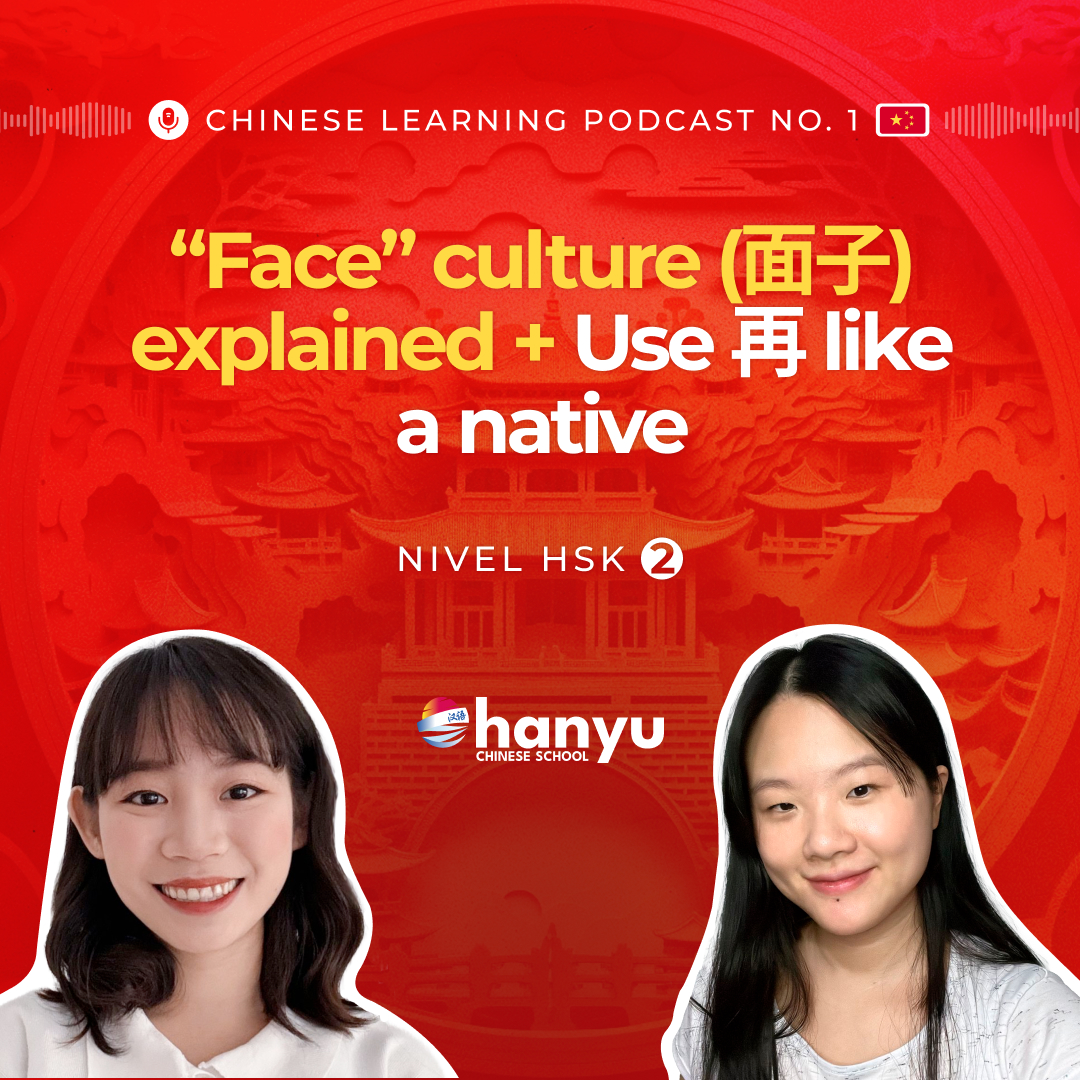Episode Transcript
[00:00:00] Speaker A: Foreign.
And welcome Back to the HSK2 Master Class podcast by Hanyu Chinese School. I'm Melanie, and today with our good friend Vicky Nihawiki.
[00:00:26] Speaker B: Ni hao, Melanie. Hi, everyone. I'm so happy for today's episode.
Today we're gonna talk about the present moment in Chinese, focusing in two very special words, which is xianzai. And.
[00:00:46] Speaker A: They both mean now, but their uses and nuance are quite different. And understanding that will make your Chinese sound more natural.
[00:00:58] Speaker B: Yes. Plus, on our cultural section, we're gonna talk about the importance of present moment in China reflected in very famous proverbs that shows how Chinese people think about time and life.
[00:01:15] Speaker A: Whoa. Interesting. So first we gonna start with our dialogue. So the setting is Melody is at home studying when Vicky calls. So the scene is casual, everyday life.
So I will start.
[00:01:40] Speaker B: Hi, Melanie.
You know.
[00:02:32] Speaker A: Okay, so now let's start with our grammar.
For the grammar, we have the two words we're focusing on and both relate to now, but their uses are quite distinct and nuanced.
[00:02:55] Speaker B: Yes. Let's start with xianzai. Xianzai. It means now or at the present time.
You can also use it as these days or currently.
It sets the time frame, but it doesn't necessarily focus on what is happening exactly at this second. For example, currently I'm preparing to go to China.
[00:03:30] Speaker A: Right.
It's often used for broader present situations or habits happening now. You can think of it like a stage setting. What's going on around this time?
[00:03:47] Speaker B: Yes.
On the other hand, with is a very special word we use to show that an action is happening right now, in progress and ongoing. Literally in the middle of doing something. For example, I am working right now.
[00:04:14] Speaker A: Yeah. So.
[00:04:19] Speaker B: Please, like I am working right now. The action is happening at this. This moment.
[00:04:26] Speaker A: Oh, yeah. So if you imagine a video is like time step showing the date. Well, is actual recording showing what's happening second by second?
[00:04:43] Speaker B: Exactly.
Always goes before the verb to highlight the continuous action.
[00:04:56] Speaker A: A common mistake learners make is using when they want to emphasize an action that is actively unfolding. For example, if you say it's fine, but to say you are in the middle of eating, it's better to say or.
[00:05:26] Speaker B: And also in spoken Chinese, people often use to make their ongoing action even clearer.
I am actually eating right now.
[00:05:45] Speaker A: Good point. The particle adds a natural tone, almost like saying, I am indeed doing it now.
[00:05:58] Speaker B: Yes.
Both words can also appear in sentence, showing cause and effect.
For example, because it's raining now, I didn't go running.
Or because I'm working right now, I Can't go.
[00:06:33] Speaker A: So here.
Can sometimes appear at the end of a sentence for emphasis in a casual speech.
I don't want to go right now. And is also great for storytelling or live commentary where you want to describe what's happening as it happens.
So you might see used similarly to.
But Zhengzai is more formal and clear in emphasizing ongoing action.
[00:07:13] Speaker B: Yes.
So distinguish these two words. Not only improve your accuracy and also helps you to sound more natural when you're describing actions or states in the present.
[00:07:31] Speaker A: Okay, now it's your turn. How would you say I am learning Chinese right now?
[00:07:44] Speaker B: Oh, it stopped by.
Literally, the signal was out.
What did you say, Melanie?
[00:07:54] Speaker A: Oh, yeah. Okay, so now it's your turn. How would you say I am learning Chinese right now?
[00:08:01] Speaker B: Oh, yeah, right.
Your sentence. In the comments, we will review the sentence. So don't be shy.
[00:08:11] Speaker A: Yeah, have a try.
[00:08:16] Speaker B: And if you are also enjoying this episode and you find it helpful, don't forget to give us a like. Subscribe and yeah, have fun.
[00:08:32] Speaker A: Yeah. And also head over to our website to try a free class with one of our native teachers.
It's the best way to practice what you have learned here.
[00:08:47] Speaker B: Yes.
And if you have friends that are also learning Chinese, don't forget to share these tools and also share today's episode.
[00:08:59] Speaker A: Okay, let's move to review the dialogue. And don't forget the grammar points and sin.
So I will start.
Hi, Vicky. What are you doing right now?
[00:09:27] Speaker B: Hi, Melanie.
Hi, Millie. I am having lunch today. Has been really busy. How about you?
[00:09:46] Speaker A: Zhengzhai Lianxi Zhong wen xiaowu Haiyao Kanshu.
I'm currently practicing Chinese and I'll read later this afternoon.
[00:10:08] Speaker B: Sounds great. Are you getting ready to go to China next month?
[00:10:18] Speaker A: Yes. Do you have time to come with me?
[00:10:28] Speaker B: I like to go, but I'm busy working right now.
[00:10:43] Speaker A: No problem.
Work is important. We can plan another day.
[00:10:53] Speaker B: Okay, see you next time.
[00:10:56] Speaker A: Okay, so maybe you have noticed.
And how do we use them in this dialogue?
Okay, let's move on.
We're gonna talk about the wisdom of the present moment in Chinese proverbs.
So let's dive deeper into those Chinese proverbs, a treasure trove of wisdom that has been passed down for thousands of years and still shapes how people think about life and time today.
[00:11:32] Speaker B: Right.
Chinese proverbs comes mainly in two forms. We have the and the.
[00:11:43] Speaker A: Song Yu are fixed four character idioms, often from ancient stories. For example, Hua shi tian zu. Drawing legs on a snake. This warns against unnecessary actions that spoil things.
As you can See, in the picture, we shouldn't.
And the next one is carrying a march on a boat to find a sword.
It mocks people who refuse to adapt to changing circumstances.
And let's see more. On the other hand, are more everyday sayings similar to English proverbs. Here are a few.
First one, the early bird catches the worm.
And don't fear going slow, fear standing still.
And next one, this one is longer.
The meaning is an inch of time is worth an inch of gold. But you can't buy that inch of time with an inch of gold.
So this highlights the priceless value of time.
[00:13:23] Speaker B: Exactly. This saying reflects a deep respect for the present moment and the time itself of ur people to act wisely and seize opportunities.
[00:13:39] Speaker A: Yes.
So let's see.
Oh, give me one sec, please.
Okay, so also, many proverbs emphasize patience and persistence values very important in Chinese culture. For example, dripping where penetrates stone, meaning perseverance leads to success.
And think three times before you act, encouraging careful consideration.
[00:14:25] Speaker B: Yes.
Understanding these proverbs not only enrich your vocabulary, but also gives you a window into Chinese philosophy where the present, as we already seen, is a moment to be valued and respected.
[00:14:46] Speaker A: Yes.
So next time you use or remember, you are connecting with a tradition that sees every moment as an opportunity, a chance to learn, grow and live wisely.
So now, the answer to our question from section four. How do you say I am learning Chinese right now?
The correct sentence is.
[00:15:27] Speaker B: Yes. Great job if you got it right. And if not, don't worry. Keep practicing and you'll get there.
[00:15:37] Speaker A: Okay.
[00:15:40] Speaker B: And now it's your turn. Write a sentence using or to tell us what are you doing right now.
[00:15:53] Speaker A: It can be anything. Studying, working, relaxing, or even cooking. So we'd love to read your sentences in the comments. So have a try.
And today we have learned how to use and to talk about the present moment and explore the cultural importance of living in the now through Chinese proverbs.
[00:16:27] Speaker B: Yes. And in our next episode, we'll learn how to use the particle dye to talk about repeated or future actions is a very useful everyday Chinese word.
[00:16:44] Speaker A: Yes. So, wow. Looking forward to that. So don't forget to subscribe. Leave us a like and share this episode with your friends.
[00:16:54] Speaker B: Yes. And don't forget to Visit our website, hanyuchineschool.com you have a free trial class with native teachers and you have lots of tools.
[00:17:09] Speaker A: Yeah. Welcome and thanks for listening today. So we're gonna see you next time.
Sa.


